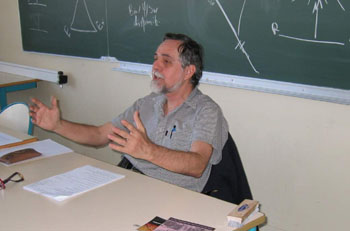Dr. Esculape, le Serpentaire
Era una vez un arte campesino y plebeyo
como todos nosotros pero,
en una de sus más belas auroras, soño,
yo seré más, más que todas las otras artes
poseeré todas las vidas, poseeré hasta las vidas
de los reyes, seré arte de las artes...
José Maria Tavares de Andrade
FOR AN ETHNOIMMUNOLOGY
If we do consider the immune phenomena from a diachronic point of view, we have to recognize an often forgotten link that I explain by the name of ethnoimmunology. This new field of ethnomedicine, at the crossroads of several spheres, is before all a perspective and a call to interdisciplinary efforts for the recognition / knowledge of the phenomena and the contexts that may be proved as pertinent for an ethnoimmunology.
In the seventies, Roger Bastide - ethnologist and physician at the Hôpital des Invalides in Paris, who then was my director of thesis, distinguished in the African context, sorcery from witchcraft: the substance locate in the stomach of certain number of people, that can be and which generally is inherited - but can also be introduced from the outside - makes its holder be a sorcerer (refer to his article Magie, in Encyclopaedia Universalis).
By studying "The witchery at the edge of the religious field and the medical field", I could identify Brazilian healers, immunized and immunizing who use their saliva as a certain form of vaccine or serum. In the traditional uses in Brazil for example, one used to eat the liver of a snake to be immunized against its poison.
On the occasion of the conference "The orifices of the body" (October 2001, University Marc Bloch - Strasbourg, published in C. Méchin, et al., preface G. Mazars, Le corps et ses orifices, Paris, l'Harmattan, 2004), l presented this proposal of an ethoimmunology, at the same time ethnography of Europe and elsewhere have confirmed that traditional uses could be pertinent from an immunological point of view.
We place in a continuum the immunitary phenomenas and the natural and artificial proceedings of self-defense, to root the cultural in the biological and itself in the physical. Ethnoimmunology is not to be defined as a prehistory of immunology that was forgotten. It intends to make a comparative study of the phenomenas of natural immunization (or from a microbiological, organical, animal point of view) and of the artificial immunizing proceedings. In addition to the ascertainment of the natural phenomenas which aroused the research of proper means of current discoveries, one propose to take in account the traditional uses (of medicine but also of sanitation, prophylaxis, child care and why not of magical cure) susceptible of being corroborated from a biological point of view.
The identification of ethnographic use and their analysis fron the point of view of immunology, on top of new medical discoveries, could legitimate traditional uses that are too often reduced, to exotical practices, which are irrational or in continuity with the animal world.
The current juncture of bioterrorism helps us to look differently at old or new challenges and stakes. Autochthonous people, victims of genocides caused namely by the diseases of the colonizers, have finally been immunized over the times. They do see their demography increase and remind having been the first victims of biological wars.
Unlike a modern medicine that ignores or denies certain traditional illneses, the field of ethnoimmunology can represent a reinvestment of scientific categories covering a not yet described reality. One has to encounter human user that can finally be inserted between a natural immunity (self-immunity, somatical, organical, animal, microbiological), and an artificial immunity (of scientific or modern medicine). Ethnoimnunology can build up a lost dialog between these medicines, that are more distant, in their codes and means than in their original purposes.

Contact : José Maria Tavares de Andrade, 36,
rue de Sélestat - F-67100 Strasbourg
Tel : 33 (0) 3 88 34 03 33 - E-mail: zeandrade@free.fr
© J.M.T. de Andrade, 2004-2006
Toute référence à ce texte doit porter la mention suivante : De Andrade
J.M.T., "For an Ethnoimmunology".june 21, 2004.
[http://ethnomedecine.free.fr/textes/ethno_im2.htm]